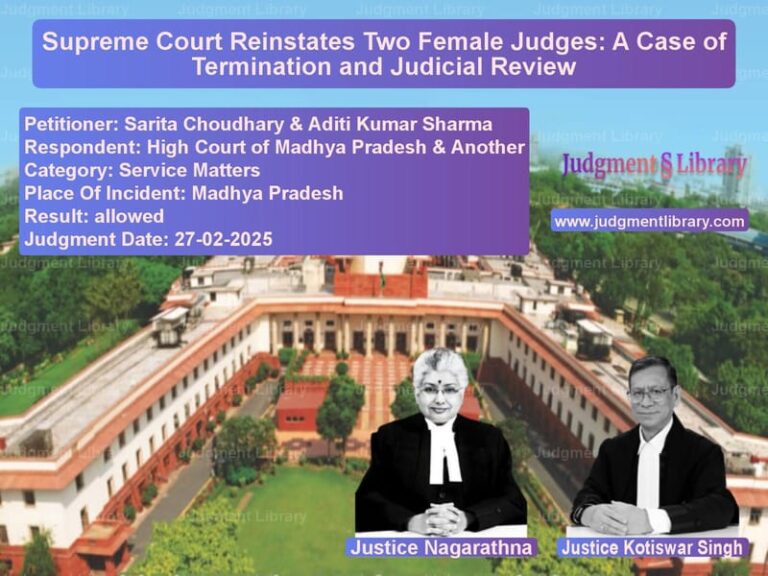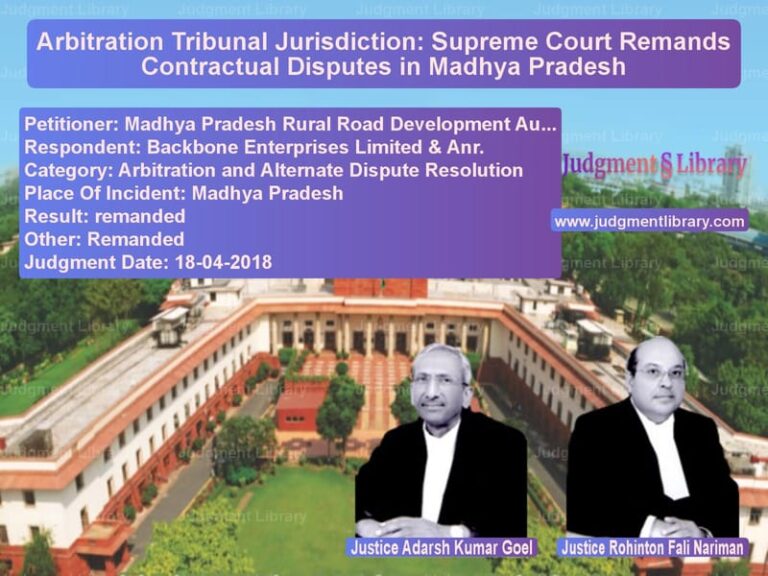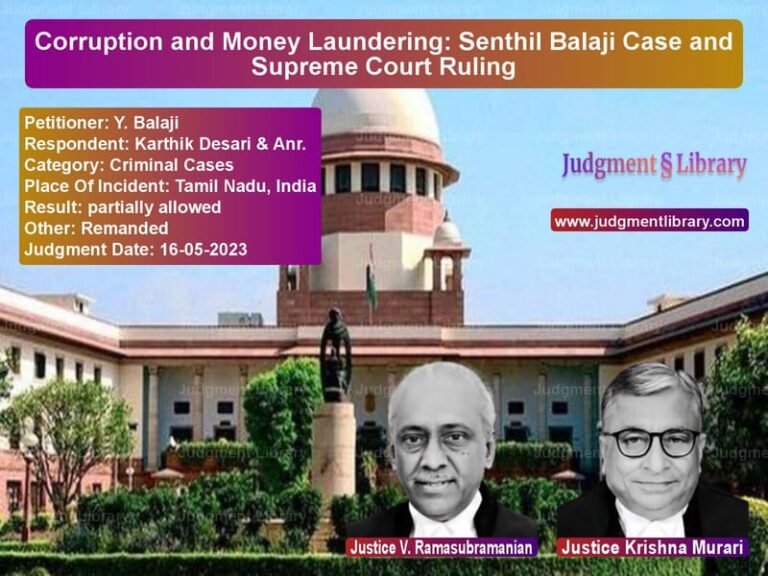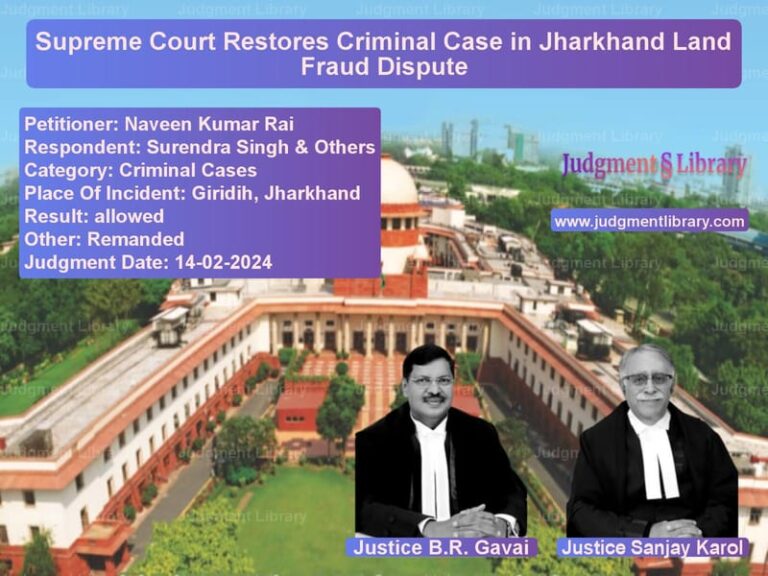Cheque Dishonour Case: Supreme Court’s Landmark Ruling on Company Representation
The Supreme Court’s ruling in M/s TRL Krosaki Refractories Ltd. vs. M/s SMS Asia Private Limited & Anr. sheds significant light on the legal procedures related to cheque dishonour cases under Section 138 of the Negotiable Instruments Act, 1881 (NI Act). The judgment clarifies the crucial aspects of filing complaints by companies and the authority required to prosecute such matters.
Background of the Case
The case stems from seven dishonoured cheques, issued by M/s SMS Asia Private Limited in favor of M/s TRL Krosaki Refractories Ltd., amounting to Rs. 1.10 crore. Upon presentation, these cheques were returned with the endorsement ‘account closed.’ The appellant company issued legal notices on 14th April 2015 demanding payment. Despite the notices being received on 16th April 2015, the respondents failed to respond or make the payment. Consequently, the appellant filed a complaint before the Sub-Divisional Judicial Magistrate (SDJM) under Section 138 and 142 of the NI Act.
The SDJM, after considering the material on record, took cognizance of the complaint and issued summons to the respondents on 5th November 2015.
Arguments of the Parties
Petitioner’s Arguments (M/s TRL Krosaki Refractories Ltd.)
- The complaint was filed by an authorized representative, Mr. Subhasis Kumar Das, General Manager (Accounting) of the company, who had sufficient knowledge of the transaction.
- The company, being a legal entity, can only act through its officers, and Mr. Das was duly authorized to file the complaint.
- The High Court misapplied the principles of A.C. Narayanan vs. State of Maharashtra & Anr., as the facts of the case were different.
- The SDJM had carefully reviewed the complaint, supporting documents, and authorization before taking cognizance.
Respondent’s Arguments (M/s SMS Asia Private Limited)
- The complaint was filed by an incompetent person, as there was no proper authorization from the company’s Board of Directors.
- Mr. Das had neither personal knowledge of the transaction nor was he a witness to it.
- The complaint lacked specific averments that Mr. Das was competent to file the case.
- The High Court rightly quashed the proceedings by relying on A.C. Narayanan, which mandates that complaints under Section 138 NI Act must be filed by an authorized individual.
Supreme Court’s Key Observations
1. Authority to File a Complaint
The Supreme Court reaffirmed that a company, being a legal entity, must act through its representatives. It emphasized that:
“The complaint was filed in the name of the company through its General Manager (Accounting), who was duly authorized by the Managing Director, and the Board of Directors had delegated the power to the Managing Director.”
The Court held that the complaint met the legal requirements and that the High Court erred in quashing the case on this ground.
2. Personal Knowledge of the Transaction
The respondents argued that Mr. Das had no direct knowledge of the transaction, making him ineligible to file the complaint. The Supreme Court rejected this contention, stating:
“Mr. Das was not only a signatory to the reconciliation statement between the parties but also a witness to the agreement dated 18.07.2014. He had also issued the legal notices when the cheques were dishonoured. Thus, he had sufficient knowledge of the transaction.”
3. Misapplication of A.C. Narayanan
The Supreme Court clarified that the High Court misapplied the principles laid down in A.C. Narayanan. While that case dealt with an individual’s power of attorney, the present case involved a company represented by its authorized officer.
“When the complainant is a company, an authorized officer can file the complaint as long as they have knowledge of the transaction. The requirement of specific averments regarding authorization was met in this case.”
4. High Court’s Role in Quashing Complaints
The Court strongly criticized the High Court for quashing the complaint at a premature stage, holding that:
“The issue of proper authorization and the complainant’s knowledge of the transaction are matters of trial. The High Court erred in invoking its power under Section 482 CrPC to quash the complaint.”
Final Judgment
The Supreme Court ruled:
- The High Court’s order quashing the complaint was set aside.
- The complaint was restored before the SDJM, Jharsuguda, for further proceedings.
- The respondents were directed to appear before the trial court on 15th March 2022.
- The trial court was instructed to conclude the proceedings within six months.
- The respondents were ordered to pay Rs. 1,00,000 in costs to the appellant.
Impact of the Judgment
This ruling reinforces the following legal principles:
- A company can prosecute cheque dishonour cases through an authorized officer.
- Explicit authorization from the Board of Directors is not mandatory if an officer is authorized by a competent authority within the company.
- High Courts must exercise caution while quashing complaints under Section 482 CrPC, especially in cheque dishonour cases where authorization is a matter of trial.
- A company’s officer need not be a direct party to the transaction as long as they have sufficient knowledge of it.
The Supreme Court’s ruling provides much-needed clarity on corporate criminal liability in cheque dishonour cases and ensures that procedural technicalities do not defeat substantive justice.
Petitioner Name: M/s TRL Krosaki Refractories Ltd..Respondent Name: M/s SMS Asia Private Limited & Anr..Judgment By: Justice N.V. Ramana, Justice A.S. Bopanna, Justice Hima Kohli.Place Of Incident: Jharsuguda, Odisha.Judgment Date: 22-02-2022.
Don’t miss out on the full details! Download the complete judgment in PDF format below and gain valuable insights instantly!
Download Judgment: ms-trl-krosaki-refr-vs-ms-sms-asia-private-supreme-court-of-india-judgment-dated-22-02-2022.pdf
Directly Download Judgment: Directly download this Judgment
See all petitions in Fraud and Forgery
See all petitions in Cheque Dishonour Cases
See all petitions in Judgment by N.V. Ramana
See all petitions in Judgment by A. S. Bopanna
See all petitions in Judgment by Hima Kohli
See all petitions in allowed
See all petitions in Quashed
See all petitions in supreme court of India judgments February 2022
See all petitions in 2022 judgments
See all posts in Criminal Cases Category
See all allowed petitions in Criminal Cases Category
See all Dismissed petitions in Criminal Cases Category
See all partially allowed petitions in Criminal Cases Category







